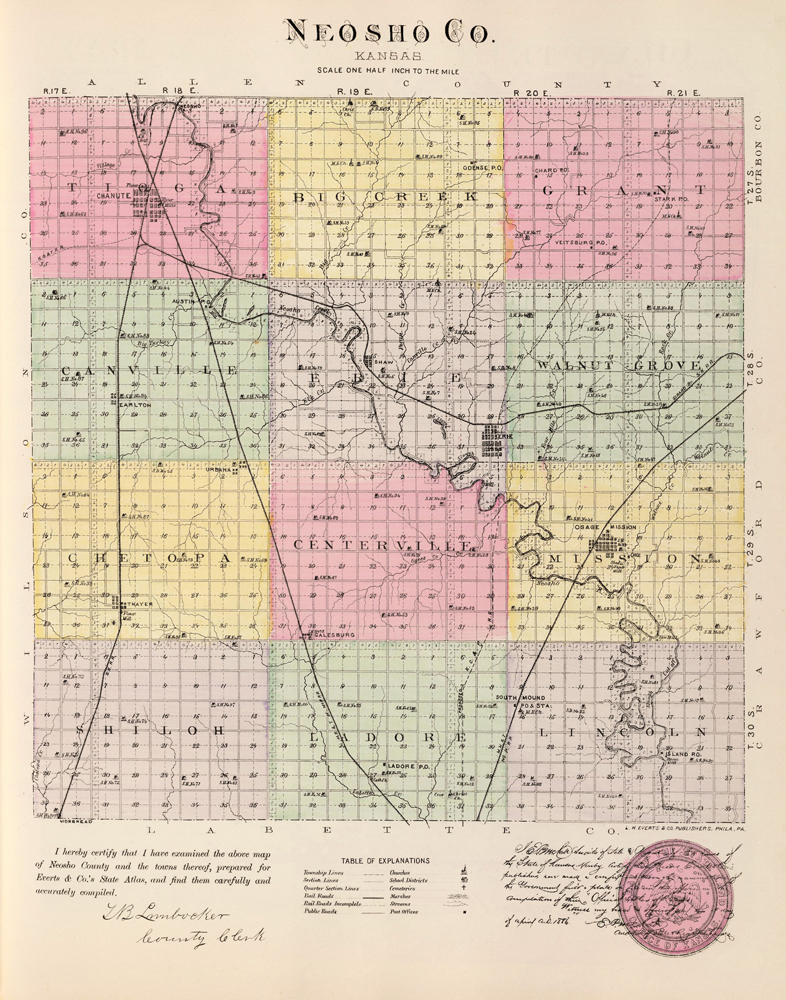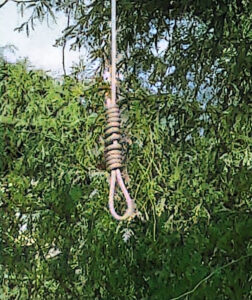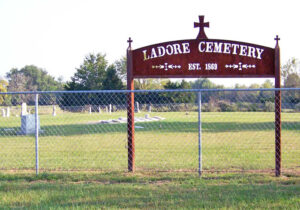Ladore, Kansas, is an extinct town in Ladore Township of southern Neosho County.
Ladore was first called Fort Roach in honor of James N. Roach, its principal founder. A native Virginian, Roach spent several years in Indiana before migrating to Kansas Territory in about 1857. Settling in Fort Scott, Kansas, he became an innkeeper and tavern owner. Having a checkered reputation as a political activist, he was said to have been a friend of John Brown. His Fort Scott business was known as “Roach House” and “Fort Roach,” and the latter nickname stuck with him. The tavern was known for rowdy parties that lasted for days and often resulted in bullet holes, one of which was an incident when Roach’s son-in-law shot and killed another man during a drunken argument. In about 1867, the Roachs sold their interests in Fort Scott and acquired land near the banks of Labette Creek in southern Neosho County.
A post office was established on October 8, 1867. In 1868, Osage Mission missionary Philip Colleton established a mission station at Ladore, and a church was built within a year. Neely & Co. erected a general store, completed in September 1869, along with a new residence for the owners. With the building of a general store and the promise of a new hotel and other businesses, Ladore would soon grow.
The report of the intention of the Missouri, Kansas & Texas Railway to make this the junction of the main line and the Neosho division of the railroad was the cause operating in favor of its rapid advancement. Its growth was so rapid that, in a few years, it reached a population of 1,000 and a proportionate number of stores, all the hallmarks of a fast-growing and substantial city. Schoolhouses, churches, and other public buildings were designed for permanence. The name was changed from Fort Roach to Ladcore on February 12, 1869.
The railroad track came to Ladore in May 1870. Within no time, immigrants, honest settlers, squatters, promoters, and adventurers, accompanied by the lowest riffraff of the frontier, were flooding into southern Kansas in the wake of the railroad. Some rail workers were a little rough around the edge, and others probably used the transient lifestyle to stay ahead of the law. Robberies and burglaries increased.
At that time, whiskey was sold almost everywhere, and vice and immorality flourished. Some folks were reportedly “shaken down” in broad daylight and relieved of their cash and valuables on Main Street. Ladore developed a reputation as one of the most violent towns in Kansas.
Ladore is “the toughest place I ever struck. Whiskey was sold in nearly every house in the town.”
— L.A. Bowes, Missouri, Kansas & Texas Railway Foreman
On May 11, 1870, five outlaws were lynched in Ladore by a group of up to 300 people after the men had robbed and beaten several citizens and raped two teenage girls.
 On Tuesday, May 10, 1870, seven men rode into Ladore, Kansas, looking to make trouble. These hard-looking men arrived about noon and began drinking. By dusk, the heavily armed thugs were knocking people down and robbing them. At approximately 7:00 p.m., they went to a boarding house operated by James N. Roach, the town’s founder. Looking to spend the night, they were refused due to their intoxication. Five took over the lower part of the building in response, while two guarded the stairs leading to the second floor, where several railroad workers boarded. Innkeeper Roach was repeatedly beaten over the head with revolvers until the desperadoes thought he was dead. The desperados then went to a bedroom where the innkeeper’s daughter and two other girls, 13 and 14-year-old sisters who worked for him, slept. Roach’s daughter escaped by slipping out of the room unnoticed, but the other hellions dragged the other two into the nearby woods near Labette Creek. Assaulting the girls throughout the night, the men continued to drink, and when two of them quarreled, the leader killed one of his men.
On Tuesday, May 10, 1870, seven men rode into Ladore, Kansas, looking to make trouble. These hard-looking men arrived about noon and began drinking. By dusk, the heavily armed thugs were knocking people down and robbing them. At approximately 7:00 p.m., they went to a boarding house operated by James N. Roach, the town’s founder. Looking to spend the night, they were refused due to their intoxication. Five took over the lower part of the building in response, while two guarded the stairs leading to the second floor, where several railroad workers boarded. Innkeeper Roach was repeatedly beaten over the head with revolvers until the desperadoes thought he was dead. The desperados then went to a bedroom where the innkeeper’s daughter and two other girls, 13 and 14-year-old sisters who worked for him, slept. Roach’s daughter escaped by slipping out of the room unnoticed, but the other hellions dragged the other two into the nearby woods near Labette Creek. Assaulting the girls throughout the night, the men continued to drink, and when two of them quarreled, the leader killed one of his men.
Near daybreak, the outlaws fled, and an alarm was sounded. Soon, a posse of citizens and railroad workers was scouring the area. One man was found in the woods, still holding one of the girls captive, and was immediately strung up to a tree. Two more were found passed out at a saloon in town, were taken to the same tree, and lynched. The three remaining outlaws were overtaken on the road to Osage Mission (St. Paul) and returned to Ladore, and two of them met the same fate. At the same time, the last man was turned over to authorities after one of the girls stated that he did not participate in the hellish deeds of the other gang members. Later, the five lifeless men were cut down and buried in a common grave beneath the tree. They were William Ryun, Patrick Starr, Patsey Riley, Richard Pitkin, and Alexander Matthews.
The plat for the town was filed on September 30, 1870, by the Missouri, Kansas & Texas Railway, and the business section was soon populated with frame and brick buildings.
However, when the company attempted to purchase the land, the settlers refused to sell at reasonable prices, and the company, having other options, refused to pay the high prices. Thus, in attempting to grasp more than was just, the settlers lost a favorable opportunity, for the company immediately negotiated for the site of Parsons, Kansas, and established that city. In early winter 1870, the railroad announced that its depot, roundhouse, and maintenance yards would be located in Parsons, thereby quickly transforming the town into a railway hub.
Afterward, Ladore’s businesses and homes were jacked up, placed on skids, and moved to new locations in Parsons. By the early 1880s, all that remained were a railroad siding, a farm residence, a church building, and the post office.
The post office closed on March 15, 1901.
Ladore was about 12 miles south of Erie, Kansas, and five miles north of Parsons. Today, the only remains of the town are the Ladore Cemetery, which is a half mile east of Lake Parsons.
©Kathy Alexander/Legends of Kansas, updated December 2025.
Also See:
Extinct Towns of Neosho County
Sources:
A Catholic Mission
Cutler, William G.; History of Kansas; A. T. Andreas, Chicago, IL, 1883.
Kansas Post Office History
Kansas State Historical Society
Ozarks History
Wikipedia
Mog, Christy; The Rough and Gone Town of Ladore, Kansas. Christy Mog, Kansas State University. Dept. of History



